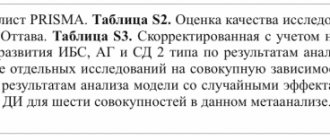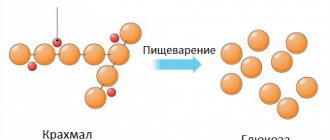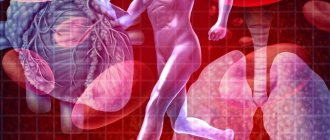Published: 01/26/2018 Updated: 03/09/2021
Vitamin deficiency can occur for a variety of reasons. The main ones include:
- monotonous diet;
- improper preparation of food;
- diseases of the gastrointestinal tract;
- pregnancy and lactation;
- stressful conditions and nervous overload;
Detailed description of the study
Vitamin B12 (cyanocobalamin) is a biologically active substance necessary for humans, which contains the coenzyme cobalamin. The vitamin is not produced in the body; it comes only from food of animal origin. Foods with the highest levels of vitamin B12 include liver, eggs, meat, cheese and milk.
Getting into the lumen of the gastrointestinal tract along with food, vitamin B12 is absorbed in the small intestine (ileum). After absorption, cyanocobalamin enters the liver, where its reserves are stored. The daily requirement for vitamin B12 is 1-3 mcg, and its reserves in liver cells can reach 3000-4000 mcg. This explains the fact that diseases associated with B12 deficiency develop gradually.
The main functions of vitamin B12 in the body:
- Participation in the growth and maturation of erythrocytes (red blood cells);
- Maintaining normal metabolism of organic (fatty) acids in nervous tissue cells;
- Regulation of glucose metabolism;
- Participation in the formation of cell DNA (regulation of the process of their division);
- Maintaining the function of the immune, nervous and muscular systems.
In the first case, B12 deficiency leads to the formation of abnormal, reduced DNA size of red blood cells - the processes of division and maturation of red blood cells are disrupted. Such red blood cells are called megaloblasts - these cells are large in size and have a fragile membrane, which is why their lifespan is usually reduced by three times (30-40 days instead of 100-120). As a result, B12 deficiency or pernicious anemia develops.
In the second case, cyanocobalamin deficiency leads to the accumulation of a toxic metabolite (methylmalonic acid), which destroys the myelin sheath of nerve fibers.
The main cause of insufficient levels of vitamin B12 is not a malnutrition, but a deficiency of intrinsic factor due to atrophic gastritis, alcohol abuse and gastric removal/resection surgery. Normally, the factor is produced by the parietal cells of the stomach and promotes the absorption of B12 in the small intestine. It ensures normal absorption of cyanocobalamin from food - in its presence, about 70% of vitamin B12 is absorbed, in its absence - 2% of all molecules. Intestinal diseases that impair absorption also contribute to B12 deficiency.
The main symptoms of B12 deficiency anemia include:
- Inflammation of the tongue (glossitis), often affecting the edges or tip of the tongue. Further, glossitis subsides, the tongue takes on a shiny “varnished” appearance;
- Pale skin, mild jaundice (against the background of anemia and the release of hemoglobin into the blood);
- Decreased appetite (especially for meat products);
- Increased size of the liver and/or spleen (in 25% of cases);
- The stool is deep brown in color.
Also, with low B12 levels, patients with anemia may develop neurological symptoms:
- Feeling of tingling, numbness, coldness in the legs (rarely in the arms);
- Muscle weakness;
- Reduced pain and temperature sensitivity;
- Mental disorders and persistent paralysis are observed in severe cases.
B12 deficiency anemia usually develops in people over 65 years of age, as well as in people who abuse alcohol. The latter are often deficient in other B vitamins (B1, B6 and B9). A deficiency of cyanocobalamin in the body can be suspected if inflammation of the tongue develops, skin becomes pale and slightly jaundiced. The study of B12 in the blood allows you to establish the correct diagnosis in differential diagnosis with other (macrocytic) anemias with a similar course.
In the laboratory department of "Hemotest" you can take a test for vitamin B12 (total), as well as its active form - holotranscobalamin - with subsequent interpretation of the result.
Indications for use, features of the analysis
Testing your cobalamin level is recommended in the following cases:
- atrophic gastritis;
- chronic inflammatory diseases;
- anatomical defects of the small intestine;
- for diagnosing anemia;
- when checking for congenital forms of B12 deficiency.
The greatest interest is in determining the level of vitamin B12 in the blood (cyanocobalamin norm). The algorithm is as follows:
- At the first stage, a blood test is performed in the laboratory to determine the vitamin content.
- Next, the patient receives cyanocobalamin, and after some time the test is performed again.
- A slight increase in B12 content indicates problems with digestibility, which is often caused by gastrointestinal diseases. If the study gives such results, then a wider examination of the patient is prescribed to identify the exact causes of malabsorption.
What else is prescribed with this study?
B vitamins (B1,B2,B3,B5,B6,B9,B12)
4.23.1. Venous blood 7 days
13 140 RUR Add to cart
Homocysteine
1.53. Venous blood 1 day
RUR 1,890 Add to cart
Complete blood count without leukocyte formula (venous blood)
3.1.1. Venous blood 1 day
330 RUR Add to cart
Folates
4.3. Venous blood 1 day
RUR 1,100 Add to cart
How to prepare for the test?
To eliminate errors in measurements that could affect research results, you should adhere to the following rules :
- Before donating blood from a vein, rest for 15 minutes so that your pulse returns to normal.
- The stomach must be empty, so it is forbidden to eat for 12 hours before the test.
- 12 hours before the test you should not smoke, drink alcohol or play sports.
- It is prohibited to take medications 1-2 days before the test. Otherwise, a decreased or increased level of vitamin B12 in the blood is possible. If stopping the medication is not possible, it is important to notify the laboratory staff.
- Children under five years of age must drink boiled water before donating blood (it is recommended to divide the intake into several portions of 170-200 ml). The liquid is drunk within half an hour.

References
- Demikhov, V.G., Skobin, V.B., Zhurina, O.N. and others. Federal clinical guidelines for the diagnosis and treatment of anemia caused by B12 deficiency, 2014. - 8 p.
- Clinical oncohematology: a practical guide / ed. M.A. Volkova M.A., 2001. -576 p.
- Arthur, C., John, E. Textbook of Medical Physiology. 13th Edition, 2015. - p. 980-987.
- Kumar, V., Abbas, A., Aster, J. Robbins and Cotran Pathologic Basis of Disease, 2014. - Vol. 1(9). — 1408 p.
- O'Leary, F., Samman, S. Vitamin B12 in health and disease. Nutrients, 2010. - Vol. 2(3). — P. 299-316.
Where is vitamin B12 used?
Bone marrow. Here, cyanocobalamin is necessary for cells to properly divide and copy their DNA. If there is not enough vitamin, copying occurs with errors, mutations occur and cells divide poorly. A person develops anemia due to the inability to produce enough red blood cells. Platelets and white blood cells may also decrease.
Nervous system. The membranes of nerve cells are made of fatty acids (Omega-3 and other fatty acids). The body synthesizes some fatty acids on its own, while others are obtained through food. In order for them to become the membranes of nerve cells, they must be oxidized; cobalamin is involved in this process. If there is little of it, then the cells of the nervous system begin to renew their membranes poorly. The result is that the central and peripheral nervous systems suffer.
Gastrointestinal tract. Cyanocobalamin is necessary for the digestive system to function fully and absorb nutrients/microelements from food.
Vitamin standards
The norm differs depending on age, the presence of diseases or physiological conditions (pregnancy). The norms for men and women differ slightly. The unit of measurement for vitamin levels is ng/l, pmol/l. The upper and lower level limits are as follows:
- Up to 200 ng/l - cobalamin deficiency.
- 200-300 ng/l is a borderline state; additional studies are recommended.
- Above 300 ng/l - the vitamin level is sufficient for the body to function properly.
What does an increase in vitamin levels indicate? A lack of vitamins, as well as their excess, can be dangerous. However, such conditions are much less common.
“If the vitamin level is higher than normal, and a person does not take vitamin B12, then this may indicate a violation of the liver, the presence of malignant tumors, etc.,” explains Lyubava Kazakova, a general practitioner at the ELISA Medical Center. — If we talk about an overdose of vitamin as a drug, then complications are possible (allergic reaction, impaired kidney function, tremors of the limbs).
A high level is caused by:
- liver dysfunction;
- myeloproliferative diseases;
- polycythemia vera;
- blood cancer;
Functional component
B12 is commonly called cobalamin. This vitamin is involved in many processes in the body, but its main task is hematopoiesis. It is involved in the creation of blood cells and DNA, and is of great assistance in the normal functioning of the human central nervous system, but there is one fun fact - no creature can generate it on its own.
Lack of this vitamin in the body is perhaps the most common in the world due to the fact that B12 can only be obtained from the outside. Since plant and animal organisms are not able to produce it, they accumulate it. It is this ability of organisms that is so useful to a person when he does not know where to get cobalamin from.
It is this substance that contributes to the color of blood. The vitamin has a complex structure, which makes it red. It also participates in cell division and normalizes the general condition of the body due to the accelerated metabolic process. Vitamin deficiency thickens the blood, which negatively affects its condition.

Vitamin B12 normalizes the muscle and nervous functions of the body, while increasing a person’s performance, concentration and vigor. The vitamin has acquired an important ability - to participate in the metabolic process of proteins, fats and carbohydrates. Other vitamins in this group can temporarily act as substitutes for cobalamin if there is a significant need for this, and therefore symptoms may not appear immediately and not so clearly.
However, this feature makes it difficult to detect cobalamin deficiency. The combination of several drugs in one syringe - dexamethasone, analgin or lidocaine and vitamin B12 - relieves severe pain. But such “cocktails” are considered unsafe, since each substance has a complex structure, as a result of which the result may be unexpected.
There is another “cocktail”, which is even called Boyko’s mixture. It is an analgesic and anti-inflammatory agent, which is often used for severe back pain. Consists of analgin, diphenhydramine, novocaine and vitamin B12.
Forms of the vitamin: what to choose for treatment and prevention?
Cyanocobalamin is produced in the form of an injection solution, in the form of tablets, lozenges, and spray. In case of vitamin deficiency, vitamin injections provide a quick effect. As for vitamins from popular sites, doctors do not recommend prescribing them yourself, because you cannot “treat” yourself with doses “like everyone else’s.”
“In case of deficiency, the doctor prescribes treatment, which includes vitamins, the correct dosage and form of taking the drug,” comments Lyubava Kazakova. — All this, including the duration of treatment, is selected individually. If treatment of anemia associated with a deficiency of folic acid or vitamin B12 is necessary, then these are other doses that the doctor selects individually. The dosage depends on concomitant diseases and test results.
Symptoms of B12 deficiency
The health danger is that the symptoms of deficiency are not always pronounced. You feel great, therefore, there is no reason to go to the doctor. A deficiency of the substance occurs when the body has not received enough cobalamin for several years. More often this is expressed:
- the appearance of glossitis (the tongue becomes red, “varnished”, a burning sensation appears), stomatitis (ulcers on the oral mucosa);
- digestive problems;
- development of B12-deficiency anemia;
- muscle weakness and the appearance of a feeling of constant fatigue, dizziness, fainting;
- tingling and numbness in the limbs;
- weakening of the body's immune forces.
A normal amount of vitamin gives a person efficiency and vigor, increases concentration.








